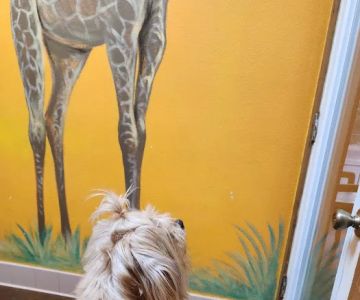How Many Years of Schooling to Be a Veterinarian: Your Complete Guide to Becoming a Vet
- 1. Understanding the Path to Becoming a Veterinarian
- 2. The Importance of Undergraduate Education for Aspiring Veterinarians
- 3. How to Get Into Veterinary School: Admissions and Requirements
- 4. How Many Years Does Veterinary School Take?
- 5. Veterinary Internships and Residencies: The Final Steps Before Practice
- 6. Real-Life Stories: Veterinarians Share Their Schooling Experience
1. Understanding the Path to Becoming a Veterinarian
Becoming a veterinarian is a rewarding and challenging journey that requires years of dedicated study and training. Many aspiring veterinarians ask the question, “How many years of schooling does it take to be a veterinarian?” While the answer may vary depending on the path you choose, the typical timeline can span 8 years or more. This includes undergraduate education, veterinary school, and potential internships or residencies.
Veterinarians play a vital role in the health and well-being of animals, working in a wide variety of fields including small animal practice, large animal care, research, and public health. The education required to become a veterinarian is rigorous, as it demands a deep understanding of animal physiology, diseases, treatments, and procedures. Along the way, veterinary students gain hands-on experience, critical thinking skills, and specialized knowledge that prepare them for their career in veterinary medicine.
In this article, we will break down the educational path, the number of years it takes to become a veterinarian, and what aspiring vets can expect at each stage of their journey.
2. The Importance of Undergraduate Education for Aspiring Veterinarians
Before entering veterinary school, aspiring veterinarians must first complete their undergraduate education. Typically, this means obtaining a bachelor's degree in a related field such as biology, animal science, or chemistry. Most veterinary schools require applicants to have completed at least three years of undergraduate study, but many students choose to pursue a full four-year degree to strengthen their applications and gain a more comprehensive background in science.
While it’s not mandatory to major in a specific subject, a strong background in the sciences—especially biology, chemistry, and physics—is essential. This is because veterinary school builds on the foundational knowledge gained in these subjects. Many students also take elective courses related to animal biology or ecology to better prepare themselves for veterinary school’s more specialized coursework.
During undergraduate years, it’s also important for aspiring veterinarians to gain relevant experience. Volunteering or working in animal clinics, shelters, or farms can give students valuable hands-on experience with animals, which is a key part of veterinary school admissions. In addition, students should focus on maintaining a high GPA and excelling in standardized tests, such as the GRE (Graduate Record Examination), which is often required for veterinary school applications.
3. How to Get Into Veterinary School: Admissions and Requirements
After completing undergraduate education, the next step for aspiring veterinarians is applying to veterinary school. Admission to veterinary schools is highly competitive, and most schools have rigorous requirements for prospective students. These include a strong academic record, relevant experience, and a genuine passion for animal care.
In addition to a high GPA, applicants must also submit letters of recommendation, a personal statement, and, in some cases, an interview. Many veterinary schools also require applicants to complete a certain number of hours of hands-on experience working with animals, which can be done through volunteering, internships, or employment in animal-related fields.
Once accepted, veterinary school itself is a four-year program designed to equip students with the knowledge and skills they need to become licensed veterinarians. The first two years of veterinary school are typically focused on classroom learning, covering subjects such as anatomy, pharmacology, and pathology. The latter two years often involve clinical training, where students gain hands-on experience working with real patients in teaching hospitals or veterinary clinics.
4. How Many Years Does Veterinary School Take?
Typically, veterinary school takes four years to complete. The program is divided into two main phases: the pre-clinical phase and the clinical phase.
Pre-Clinical Phase (Years 1-2): In the first two years of veterinary school, students focus on foundational subjects such as biology, anatomy, pharmacology, and microbiology. This period of intensive study provides the theoretical knowledge necessary for veterinary practice. It’s during these years that students also begin to study the various systems of the body, how diseases affect animals, and the treatments available.
Clinical Phase (Years 3-4): The final two years of veterinary school are more hands-on and involve working directly with animals in clinical settings. Students will spend a significant amount of time in veterinary teaching hospitals or clinics, diagnosing and treating patients under the supervision of experienced veterinarians. This clinical training is critical for students to gain real-world experience and confidence in their ability to care for animals.
After completing these four years, students graduate with a Doctor of Veterinary Medicine (DVM) or Veterinariae Medicinae Doctoris (VMD) degree, depending on the institution. However, many veterinarians continue their education through internships, residencies, or additional certifications, which can extend the education timeline.
5. Veterinary Internships and Residencies: The Final Steps Before Practice
After completing veterinary school, many veterinarians choose to further specialize in a specific area of veterinary medicine, such as surgery, dermatology, or internal medicine. This requires completing an internship or residency program, which typically lasts an additional 1-5 years depending on the field of specialization.
Internships are typically one-year programs where newly graduated veterinarians gain experience in a specific field under supervision. Residencies, on the other hand, are more in-depth training programs lasting 3-5 years, during which veterinarians work closely with specialists to hone their skills in a particular area. These programs can significantly enhance a veterinarian's expertise and career prospects, though they are optional for general veterinary practice.
These additional years of schooling provide the opportunity for veterinarians to refine their practice, contribute to research, and gain recognition as specialists in their field. While not required for all veterinarians, completing an internship or residency can be a great option for those aiming for specialized careers or academic positions.
6. Real-Life Stories: Veterinarians Share Their Schooling Experience
Real-life experiences can shed light on what the journey to becoming a veterinarian is really like. For instance, Sarah, a recent veterinary school graduate, shared how she spent four years studying intense subjects and engaging in hands-on clinical practice. “It wasn’t easy, but every year of schooling built upon the last, and now I feel incredibly confident in my ability to treat animals,” she said. Sarah’s story mirrors the experiences of many veterinary students who face challenges along the way but ultimately find it incredibly rewarding.
Another example is Dr. John, a veterinary surgeon who completed a 1-year internship followed by a 4-year residency in orthopedic surgery. He notes, “The extra years of training were difficult, but I learned so much and am now able to perform complex surgeries that save lives. The education I received has been invaluable in my career.”
These stories highlight the dedication required to become a veterinarian and the rewards that come with completing the extensive education process. Whether you choose to specialize or practice general veterinary care, the years spent in schooling will equip you with the tools to make a real impact in the field.











